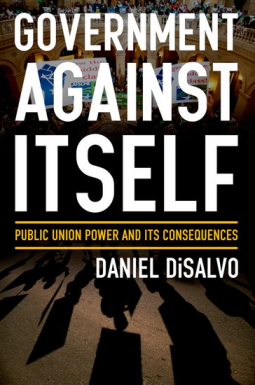
Government against Itself
Public Union Power and Its Consequences
by Daniel DiSalvo
This title was previously available on NetGalley and is now archived.
Buy on Amazon
Buy on BN.com
Buy on Bookshop.org
*This page contains affiliate links, so we may earn a small commission when you make a purchase through links on our site at no additional cost to you.
Send NetGalley books directly to your Kindle or Kindle app
1
To read on a Kindle or Kindle app, please add kindle@netgalley.com as an approved email address to receive files in your Amazon account. Click here for step-by-step instructions.
2
Also find your Kindle email address within your Amazon account, and enter it here.
Pub Date Jan 06 2015 | Archive Date Jan 05 2015
Description
As workers in the private sector struggle with stagnant wages, disappearing benefits, and rising retirement ages, unionized public employees retire in their fifties with over $100,000 a year in pension and healthcare benefits. The unions defend tooth and nail the generous compensation packages and extensive job security measures they've won for their members. However, the costs they impose crowd out important government services on which the poor and the middle class rely. Attempts to rein in the unions, as in Wisconsin and New Jersey, have met with massive resistance. Yet as Daniel DiSalvo argues in Government against Itself, public sector unions threaten the integrity of our very democracy.
DiSalvo, a third generation union member, sees the value in private sector unions. But in public sector, unions do not face a genuine adversary at the bargaining table. Moreover, the public sector can't go out of business no matter how much union members manage to squeeze out of it. Union members have no incentive to settle for less, and the costs get passed along to the taxpayer. States and municipalities strain under the weight of their pension obligations, and the chasm between well-compensated public sector employees and their beleaguered private sector counterparts widens. Where private sector unions can provide a necessary counterweight to the power of capital, public employee unionism is basically the government bargaining with itself; it's no wonder they almost always win. The left is largely in thrall to the unions, both ideologically and financially; the right would simply take a hatchet to the state itself, eliminating important and valuable government services. Neither side offers a realistic vision of well-run government that spends tax dollars wisely and serves the public well. Moving beyond stale and unproductive partisan divisions, DiSalvo argues that we can build a better, more responsive government that is accountable to taxpayers. But we cannot do it until we challenge the dominance of public sector unions in government.
This carefully reasoned analysis of the power of public sector unions is a vital contribution to the controversial debates about public versus private unions, increasing inequality, and the role of government in American life
DiSalvo, a third generation union member, sees the value in private sector unions. But in public sector, unions do not face a genuine adversary at the bargaining table. Moreover, the public sector can't go out of business no matter how much union members manage to squeeze out of it. Union members have no incentive to settle for less, and the costs get passed along to the taxpayer. States and municipalities strain under the weight of their pension obligations, and the chasm between well-compensated public sector employees and their beleaguered private sector counterparts widens. Where private sector unions can provide a necessary counterweight to the power of capital, public employee unionism is basically the government bargaining with itself; it's no wonder they almost always win. The left is largely in thrall to the unions, both ideologically and financially; the right would simply take a hatchet to the state itself, eliminating important and valuable government services. Neither side offers a realistic vision of well-run government that spends tax dollars wisely and serves the public well. Moving beyond stale and unproductive partisan divisions, DiSalvo argues that we can build a better, more responsive government that is accountable to taxpayers. But we cannot do it until we challenge the dominance of public sector unions in government.
This carefully reasoned analysis of the power of public sector unions is a vital contribution to the controversial debates about public versus private unions, increasing inequality, and the role of government in American life
Available Editions
| EDITION | Hardcover |
| ISBN | 9780199990740 |
| PRICE | $27.95 (USD) |



